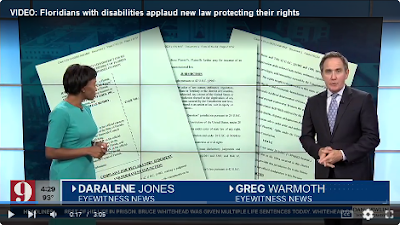by Sabrina Maggiore,Charles Frazier
Millions of Floridians with disabilities are celebrating a new law that protects their rights.
Those new protections are listed under a Florida law that took effect this week.
Under the law, courts are now required to consider what’s known as “supportive decision-making agreements” before they place someone in legal guardianship, allowing people with disabilities to appoint helpers for certain jobs.
Michael Lincoln-McCreight became the first person in Florida to end a guardianship in favor of a supported decision-making agreement. He spent four years lobbying for a change to the law after his rights were stripped from him.
Born with fetal alcohol syndrome, autism, and ADHD, Lincoln-McCreight today is living his dream life.
He’s accomplished a life-long goal of working for Universal Orlando and supports himself in his Orange County home. He says he does not take it for granted.
“I feel like I went from being a prisoner to being a free human being,” Lincoln-McCreight said.
Lincoln-McCreight says he remembers the moments he aged out of foster care, was declared incapacitated, and was placed under guardianship.
“They take all your rights away,” Lincoln-McCreight recalled. “The right to vote. The right to get married. The right to choose who your relationships are...everything is literally stripped for you.”
Lincoln-McCreight spent years in court fighting to restore those freedoms. In 2016, a doctor and judge found he could make his own decisions, and his guardianship ended in favor of supported decision-making.
“You get help with the support of family and friends that you trust,” Lincoln-McCreight said.
For the last four years, he lobbied for the new state law requiring judges to consider alternatives to guardianship, like a notirzed, supported decision-making agreement.
Matt Dietz of Nova Southeastern Law School says the informal agreements grant supporters privileges to help those with special needs.
“Think of it as a continuum between the most restrictive and the least restrictive,” Dietz explained. “Courts now have to say, ‘Okay, you’ve come here for a guardianship, what types of decisions can this person make by themselves,’ before they say ‘the person loses all of their rights.’”
For Lincoln-McCreight, the law was worth the fight.
“This is going to make not only a difference for one person but millions of Floridians with disabilities,” Lincoln McCreight said.
The law also requires third parties to recognize supported decision-making agreements.
For
example, schools and hospitals must allow appointed supporters to
access confidential records if the agreements are in place.
Full Article & Source:
Floridians with disabilities applaud new law protecting their rights



1 comment:
Good news for Florida. I hope all states pass this law.
Post a Comment